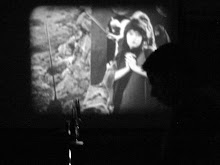Peter Carey is in the running for an unprecedented third Booker Prize this year. Having read a few other winners, longlisted and shortlisted novels of this prize I think this has what it takes to win. In fact, I liked the novel so much I wish I'd taken notes as I read to do a better job with this review. Am sure to read it again in future.
My lack of awareness of Alexis de Tocqueville eliminated the possibility of familiarity with his publications. Parrot, etc. is based on Tocqueville's visit to America which lead, subsequently, to classic treatises on democracy. If Carey were to win this year it would lead me to believe that he has discovered a Booker Prize winning formula; select a character from history and retell the story under the guise of fiction. 'The True History of the Kelly Gang', which I must must must get to soon, appears to be cast in a similar mould. The reader must forgive my insolence for I type, merely, in jest and, it absolutely must be added, that my first perusal of this novel, in its rather unusual typeface, cannot be thorough but was thoroughly rewarding. (I like the structure of the previous sentence!)
I've read very little historical fiction. Some recent ones are Amitav Ghosh's "Sea of Poppies" and David Mitchell's "The Thousand Autumns of Jacob de Zoet". In comparison to these novels "Parrot, etc." is unconventional. Carey doesn't bother with setting up a plot. Nothing much is at stake for the characters in this novel, there is nothing they have to get to in any urgency. The characters don't experience the pressures and obstacles protagonists usually do in other fictional works. Both Parrot and Olivier live within their French societal norms. Parrot is Olivier's servant. To me this book is about their minds, the thougths of two individuals separated by class in nineteenth century France. On one hand we have Parrot whose life is one mangled by art, war, servitude, escape, exploitation and, finally, entrepreneurship. On the other hand, we have a French noble who can't pack his luggage for voyages he seems to be making often in this book, doesn't bathe or dress himself, can't even write legibly but undertakes the task of understanding the penitentiary system and, later on, democracy in the newly formed America.
There are sections of the novel which I love. One takes place when the heroes visit a Frenchman's library for a copy of 'Tartuffe'. It's Carey's description of the library and the wine that put me in the library with the characters. I could picture the library, smell the books and taste the wine. Another takes place when Parrot is on vacation in New York and has nothing to do which frustrates him. Parrot looks around describing New York, explaining the people he sees who are very very busy while he has no job, nothing with which to occupy himself. His regret for his present disposition, his regret for having neglected his skill for engraving are killing him. I feel like that so often these days. Then there are the pages in the book describing Olivier's thoughts when he is in love. It isn't new, for sure, but the context of him not liking US, read Olivier's thoughts on the Fourth of July celebrations for example, and still willing to accept the US for love provide interesting points of conflict to reflect upon. The first person narration in this book is more effective in comparison to any other book as it truly opens the narrator's mind to the reader. Two separate narrators also was a very good idea here because Parrot uses America to his advantage but Olivier is not comfortable here. This brings out two different points of view, one who needs America to raise himself and the other who has already has everything he could ever want.
The book falls into traps of regular Hollywood/Bollywood scripts and popular fiction, which I thought I wouldn't like, but it is how it comes out of them that I liked. Parrot realizes that he has been cheated of credit in published books and doesn't go out seeking revenge, rather uses the same person to set up a business. Olivier doesn't bring Amelia to France after all that happens. Master and servant don't unite as a conclusion to the book.
The conclusion of the novel with Olivier's strong criticism of democracy is in line with Carey's opinion of us being dumbed down over the years. Olivier blames it on democracy here where "the public square will be occupied by an uneducated class who will not be able to quote a line from Shakespeare." Olivier adds "art will be produced to suit the market" and that people will derive culture "from the newspapers". Carey seems to be blaming democracy for our stupidity here, that's the way I read it. In another piece on the Internet he is quoted as saying "consuming cultural junk.....is completely destructive of democracy." I have, for nearly a decade now, been skeptical of popular opinion. Now am also not swayed much by popular fiction, in books and movies. Why should it be that majority is correct? Why did people want 'Avatar' to win the Oscar for best picture and not 'The Hurt Locker'? Why is it that popular fiction almost never wins literary awards? Why aren't we taught to understand paintings or sculpture but end up admiring well-sculpted bodies of celebrities? Why is Classical music not understood or heard by the majority? These are definitely food for thought.

No comments:
Post a Comment